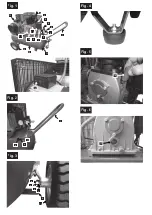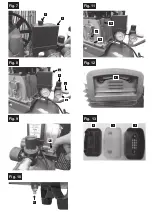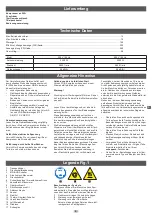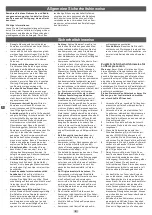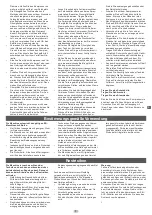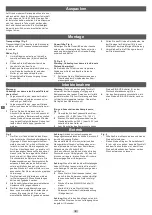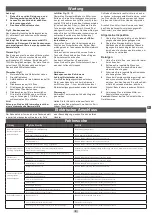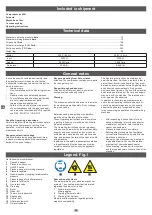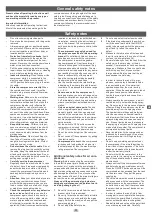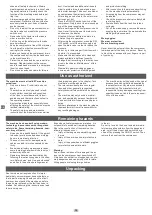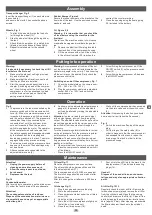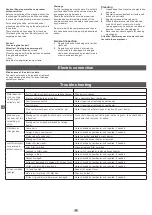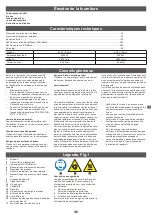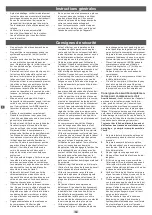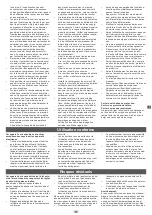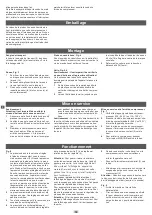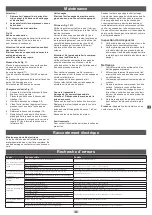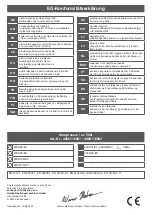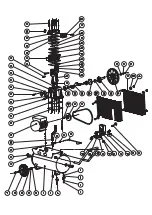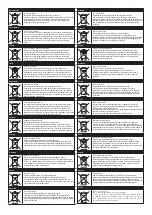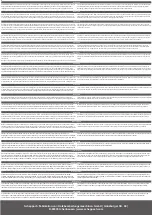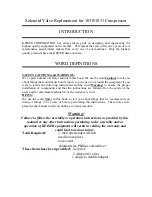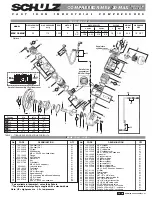
General safety notes
Preserve these Operating Instructions well
and have them carefully read by every per-
son working with the compressor.
Important information
Attentively read these Operating Instructions.
Most of the accidents when working with the
compressor occur through neglect of the basic
safety rules. Recognizing potential dangers in
time and conscientious observance of the safety
instructions can avoid accidents. Only use the
compressor following the recommendations of
the manufacturer.
Safety notes
• Do not touch moving machine parts.
• Do not use the compressor with the guards
removed.
• Always wear goggles or another adequate
eye protection. Never point the compressed
air current towards a part of your body or
towards another person.
•
Protection from electric shocks.
Avoid
inadvertent contact with the cables, the
tank, or earthed metal parts of the com-
pressor. Never use the compressor close to
water or in a humid environment.
• Pull the power supply plug before starting
repair, inspection, maintenance, or cleaning
work, or before replacing any parts.
•
Inadvertent starting.
Do not transport the
compressor while it is connected to the
electric power. Make sure the switch is
in OFF position before you plug in the elec-
tric cable.
•
Store the compressor correctly
. When
the compressor is not used, it must be
stored in a dry place protected from wea-
ther conditions.
•
Working area.
Make sure the work place
is clean and well aerated. Put away any
tools that are not needed. Do not use the
compressor together with inflammable
liquids or gases – risk of electric shock.
Protect the compressor from rain and do
not use it in humid or wet conditions. Since
sparks can emanate from the compressor
during work, it must be kept away from
lacquers, gasoline, chemicals, glues, and
other inflammable or explosive materials.
•
Keep children away
. Children, third per-
sons or animals may not get in touch with
the compressor. Unauthorized persons
must observe a safety distance from the
working zone.
•
Working clothes
. Wear close fitting clo-
thes. Take off jewels as they could get
caught in moving machine parts. Protect
long hair by a net or cap.
•
Do not misuse the electric cable
. Do not
remove the plug from the socket by pulling
the cable. Keep the cable away from heat,
oil and surfaces with sharp edges. Do not
step on the cable, and do not squeeze it by
putting heavy weights on it.
•
Carefully service the compressor
.
Regularly check the electric cable. In case
of a defect, have it repaired or replaced by
an authorized service station. Carefully
inspect the compressor from outside and
have any defects repaired by a service
station.
•
Attention.
Keep your mind at what you are
doing. Use your common sense. Never
work with the compressor when you are
tired, or under influence of alcohol, drugs,
or medicines causing drowsiness.
•
Check the compressor for any defective
parts or loss of ai
r. Before you use the
compressor again, check the correct po-
sition of the moving parts, cables, mano-
meter, compressed air connections and
all other parts important for the correct
operation. Defective components must be
repaired or replaced by an authorized ser-
vice station, observing the instructions gi-
ven in this manual. The compressor may
not be used with the pressure control valve
defective.
•
The compressor may only be used for
the purposes specified in this operating
manual
. Do not allow children or inexperi-
enced persons work with the compressor.
The compressor is a machine genera-
ting compressed air. Use it according to
the instructions given in this manual. Any
other use exceeds authorization. The ma-
nufacturer is not responsible for any dama-
ges resulting from unauthorized use; risk is
the sole responsibility of the operator.
• Keep the venting grids clean, especially
when working in dirty conditions.
• Use the compressor at the rated voltage
indicated on the model plate with the elec-
trical data. The admissible tolerance range
is +/- 5 %.
•
Never use a defective compressor
. If,
during operation, you note a strange noise,
excessive vibrations or any defects, switch
it off immediately, check its good working
order or contact your authorized service
station.
•
Only use original spare parts
. The use
of non-original spare parts renders the
warranty invalid, and it can cause a mal-
function of the compressor. Do not make
any arbitrary modification on the compres-
sor. Have repairs done by an authorized
service station.
• Put the switch to OFF position when the
compressor is not used. Put the switch to
„0“ (OFF) to interrupt the power supply.
• Do not touch the hot parts of the compres-
sor.
• Do not switch off the compressor by pulling
the electric cable.
•
Compressed air circuit
. Use compressed
air hoses and tools made for a higher (or
identical pressure) than the maximum ope-
rating pressure of the compressor.
Additional safety notes for air com-
pressors
Warning:
Before connecting the compressor
to the electric power (main switch on machi
-
ne, socket, etc.), make sure the power supply
corresponds with the data on the model plate. A
higher mains voltage can cause serious injuries
and damage the machine. Do not connect the
machine in case of doubt. If the mains voltage is
too low, the motor can get damaged.
Always pull the power supply plug before
doing any maintenance or adjustment work,
including changing the oil.
1
Never try to remove a part from the com-
pressor while it is pressurized.
2
Never try to remove an electrical part while
the compressor is connected to the mains
supply. Switch the machine off and pull the
power supply plug.
3
Do not adjust the safety valve.
4
Do not use an electrical extension cable.
5
If the drain plug underneath the switch co-
ver (2) does not work while the ON/OFF
switch is depressed, switch the power sup-
ply off and try to find the cause for the
defect.
6
Make sure the lubrication oil is clean and
the oil level remains in the centre of the red
circle on the oil sight glass (16).
7
Be careful when you vent the tank (from the
safety valve, the drain plug, or the air
escape). Compressed air can be extremely
dangerous. Make sure the air current does
not whirl up any dust, stones or other
foreign bodies. Be also sure that the air
does escape in a safe way.
• In order to reduce the risk of fire or ex-
plosions, never spray inflammable fluids
in an enclosed room. It is normal that
sparks escape from the motor during
operation. When these sparks get in touch
with gasoline vapours or inflammable
liquids, they can ignite and cause fire or
explosions.
• Always operate the compressor in a well
vented room. Do not smoke during spray-
ing. Do not spray in the presence of sparks
or flames. Keep the compressor as far as
possible away from the spraying place.
The liquids trichlorethane and methylen-
chloride can cause a chemical reaction
with aluminium that is used in some paint
spray cartridges and can cause an explo-
sion. If these liquids are used, make sure
the spraying is only done with spraying bins
made of stainless steel. The compressor is
not impaired by these liquids.
• Never inhale directly the compressed air
produced by the compressor. Do not use
the compressed air for filling breathing
tanks.
• Do not use any welding equipment near
the compressor. Do not weld anything to
the air tank of the compressor: This could
dangerously weaken the tank and would
render the warranty invalid.
• Do not work with the compressor in the
open air while it is raining, or on a wet base.
Any of these situations could cause an
electric shock.
• Always switch off the compressor after use
and before doing any maintenance work.
Press the ON/OFF button and wait until the
compressed air has escaped from the tank
via the drain valve. Then pull the power
supply plug.
• Check the maximum admissible pressure of
all devices used with the compressor. The
output pressure on the compressor must
be set in such a way that it never exceeds
the prescribed pressure of devices or ac-
cessories.
• In order to reduce the risk of injury from
moving parts, never operate the compres-
sor without the guard fitted. Let hot compo-
nents cool down before touching them.
• Read all labels and notes on the paint tank
or on other spray materials. Carefully
11
D
GB



